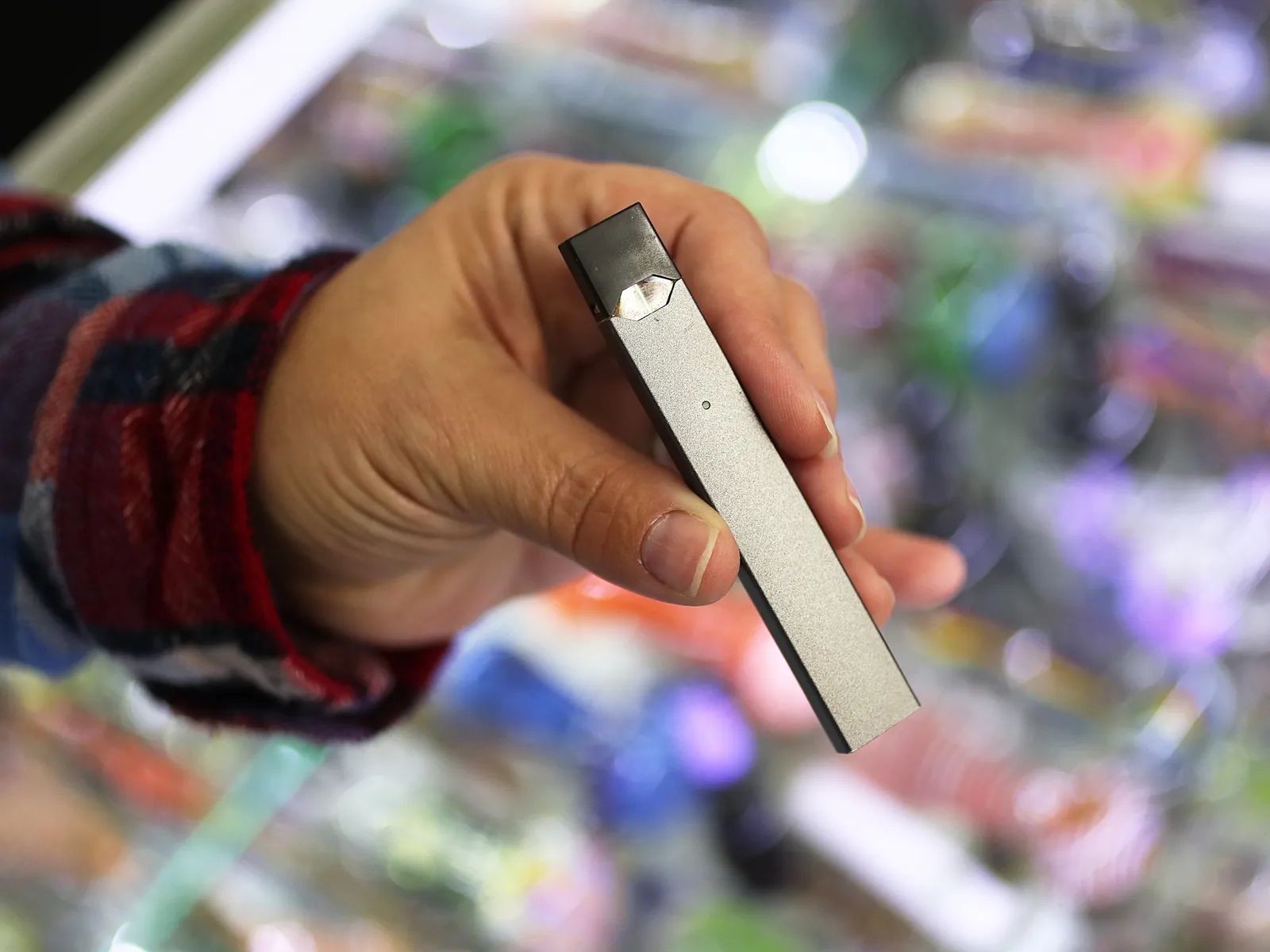Health
Vape Catalogs News – Vaping Legality Status for Delaware

Vapers can choose from several devices, e-liquids, and accessories. Vaping laws vary widely by state. This page discusses Delaware’s vaping legality, including product legality, age limitations, public usage and indoor vaping, advertising and marketing prohibitions, and vaping businesses.
Legal Status of Vaping Products
Delaware, like many other states, regulates vaping sales and use. The state prohibits selling vaping items to kids under 21 because they are tobacco products. This follows the December 2019 federal law raising the vaping product buying age from 18 to 21.
Delaware has strict labeling and packaging laws, even if vaping is permitted at 21. These guidelines require manufacturers and merchants to mark nicotine and health warnings clearly. These approaches increase consumer safety and vaping risk awareness.
Age Restrictions
Vaping product age restrictions are crucial to vaping regulation. Delaware, like federal law, has set the vaping and tobacco product purchasing age at 21. The state bans under-21s from buying vaping products.
Age limits are crucially enforced by retailers. They must verify ID for all customers under 30. Vaping merchants who sell to minors face fines and license suspensions. These regulations preserve youth health and prevent hazardous vaping behaviors.
Public Usage and Indoor Vaping
Vaping is likewise restricted in Delaware, especially indoors. The state’s Clean Indoor Air Act bans smoking and vaping in restaurants, bars, and enclosed workplaces. It’s important for vapers to know their local laws because some may limit vaping in more public locations.
Indoor vaping is restricted to protect public health and reduce secondhand aerosol. Vaping is often less dangerous than smoking, although e-cigarette vapor can include harmful compounds, according to studies. Thus, restricting indoor vaping protects non-vapers from aerosol exposure dangers.
Advertising and Marketing Restrictions
Delaware has severe vaping advertising and marketing laws. These rules discourage youth targeting and promote ethical marketing. Important state advertising and marketing prohibitions include:
No Minor Advertising: Vaping companies cannot market to minors. This includes cartoon characters, colorful packaging, and other youth-attracting methods.
Free samples of vaping goods are illegal because they may entice non-smokers, especially young people, to try it.
Delaware restricts internet vaping sales to ensure age verification and compliance with state laws. Retailers must verify consumer age before sending vaping products
Health Warnings: Vaping product packaging and ads must prominently warn people about vaping dangers.
These advertising and marketing prohibitions prevent vaping companies from glamorizing or pushing their products to boost use, especially among minors. They also educate people about vaping concerns.
Vaping Shops
Vaping shops, often known as e-cigarette retailers, are vital to the vaping community. These places let vapers buy things, get assistance, and meet other enthusiasts. Delaware vaping shops must follow state and federal legislation.
Age Verification: Delaware vape establishments must verify customer ages before selling items. These shops prohibit under-21s and require ID checks.
Product Labeling and Packaging: Vaping establishments must label and package their products according to state regulations, including clear nicotine content labeling and health warnings.
While vape businesses may offer product sampling, they cannot enable children to sample any vaping items.
Retailers cannot have vaping product self-service displays. This prevents minors from accessing these products without age verification.
The purpose of these restrictions is to make vaping establishments safe and responsible. Delaware balances adult vapers’ needs with youth health by enforcing age limitations and encouraging labeling and packaging compliance.
Conclusion
Like many states, Delaware has strong vaping product laws, including age, public use, and marketing prohibitions. These restrictions safeguard inhabitants, especially children, while allowing adult vapers to use their products. For legal compliance, Delaware vapers and sellers must stay current on rules.
Trustworthy sources like Vape Catalogs can provide vaping news and updates. These sites update users on vaping regulations, new products, and industry changes. Vapers and vaping businesses must stay current with such sources to manage the evolving legal landscape and make informed decisions.
Health
How WellHealthOrganic Home Remedies Tag Connect Mind, Body, and Environment
In this blog post, we’ll explore how simple yet profound practices can transform your well-being while fostering a deeper connection with nature. From age-old remedies that celebrate the earth’s bounty to mindful habits that nurture your spirit, join us on a journey toward comprehensive wellness that honors both you and our shared environment. Ready to discover the synergy between self-care and eco-consciousness? Let’s dive in!
Introduction to Holistic Living and WellHealthOrganic Home Remedies Tag
In a world buzzing with modernity and fast-paced living, many are rediscovering the age-old wisdom of holistic living. It’s an approach that harmonizes mind, body, and environment to foster overall well-being. At the heart of this movement is the WellHealthOrganic home remedies tag—a treasure trove of natural solutions derived from traditional knowledge. Imagine harnessing nature’s bounty to address life’s various challenges while nurturing your mental peace and protecting our planet. Whether you’re seeking relief from everyday ailments or aiming for a more sustainable lifestyle, embracing these practices could transform your health journey into something truly enriching. Let’s explore how you can connect deeper with yourself and the Earth through simple yet powerful home remedies!
Understanding the Mind, Body, and Environment Connection
The mind, body, and environment are intricately linked. When we neglect one aspect, the others often feel the strain. Mental clarity can influence physical health; stress may manifest as fatigue or illness.
Our surroundings play a significant role in this connection. A cluttered space can lead to feelings of anxiety and unrest. Conversely, nature’s beauty promotes tranquility and boosts mental well-being.
Engaging with our environment also impacts how we care for ourselves. Organic methods nurture not just our bodies but encourage a symbiotic relationship with nature.
This holistic approach fosters mindfulness across all areas of life. Healthy choices resonate throughout—what we consume affects both our inner state and the planet’s health.
Understanding this synergy is vital for achieving balance in daily living.
The Origins of WellHealthOrganic Home Remedies: Traditional Knowledge and Wisdom
WellHealthOrganic home remedies draw from centuries of traditional knowledge. Cultures around the world have utilized natural ingredients to promote health and wellness long before modern medicine.
Ancient civilizations relied on herbs, spices, and plants for their healing properties. This wisdom has been passed down through generations, creating a rich tapestry of practices that emphasize harmony with nature.
These remedies reflect an understanding of the body’s innate ability to heal itself. The focus is not just on treating symptoms but nurturing overall well-being.
Traditional healers often viewed illness as an imbalance in one’s environment or lifestyle. Their approaches were holistic, considering physical health alongside mental and emotional states.
As we embrace WellHealthOrganic home remedies today, we connect with this legacy. It reminds us that sometimes nature holds the answers we seek for our mind and body challenges.
Common Ingredients Used in WellHealthOrganic Home Remedies Tag and Their Benefits
WellHealthOrganic home remedies tag harnesses the power of nature through various common ingredients. These natural elements offer a plethora of health benefits, making them essential in holistic living.
Turmeric stands out for its anti-inflammatory properties. It can aid digestion and boost immunity, providing a golden touch to numerous recipes.
Honey is another staple, known for its soothing effects. This sweetener helps with coughs and throat irritation while also serving as a natural moisturizer for skin care.
Ginger is revered for its ability to combat nausea and improve circulation. Adding it to meals or teas enhances flavor while supporting overall wellness.
Aloe vera is celebrated not just for skincare but also for digestive health. Its gel form hydrates the skin and promotes gut healing when consumed.
These ingredients are easily accessible yet powerful tools in nurturing both mind and body through holistic practices.
Also, read more Discover the Healing Power of Wellhealthorganic Home Remedies Tag for Everyday Ailments
Recipes for DIY Home Remedies for Various Ailments and Concerns (Mind, Body, Environment)
Crafting your own home remedies can be a fulfilling experience. It connects you with nature and empowers you to take control of your health.
For stress relief, try a calming lavender tea. Steep dried lavender flowers in hot water for about 10 minutes. The soothing aroma helps quiet the mind.
If you’re dealing with seasonal allergies, consider a honey and lemon elixir. Mix local raw honey with fresh lemon juice in warm water. This concoction not only supports immunity but also provides relief from irritants.
For skin irritation, an oatmeal bath is incredibly effective. Blend oats into a fine powder and add it to warm bathwater. Soaking will help soothe irritated skin naturally.
Lastly, create an all-purpose cleaner using vinegar and essential oils like tea tree or eucalyptus. It’s safe for the environment while keeping your space fresh and clean without harsh chemicals.
The Importance of Sustainability in Holistic Living: Using Natural Resources Responsibly
Sustainability is at the heart of holistic living. It emphasizes a balanced relationship with nature, promoting health for both individuals and the environment.
Using natural resources responsibly ensures that we maintain ecological harmony. By choosing organic materials and local products, we reduce our carbon footprint and support local economies.
Holistic practices encourage mindfulness about consumption patterns. Every choice matters—whether it’s opting for reusable items or growing your herbs. These small changes lead to significant impacts over time.
Engaging with nature also fosters a deeper connection to our surroundings. This awareness cultivates respect for ecosystems and encourages us to protect them.
Ultimately, embracing sustainability within holistic living enriches our lives while safeguarding the planet for future generations.
Integr
Integrating holistic living into your daily routine can lead to a more balanced and fulfilling life. By adopting the WellHealthOrganic home remedies tag, you nurture not just your body but also your mind and the environment around you. This comprehensive approach promotes overall well-being while respecting nature’s resources.
As you explore the world of natural remedies, remember that each ingredient has its unique properties that contribute to healing. Embracing these ancient practices opens doors to sustainable living, allowing us to take responsibility for our health and our planet.
Incorporate simple DIY recipes into your lifestyle and observe how they harmonize with both personal wellness goals and environmental consciousness. Whether it’s brewing herbal teas or creating soothing balms, every step taken toward holistic living is a step towards a healthier future for yourself and generations to come.
So why not make this journey today? The path is inviting; all it takes is one small change at a time. Dive deeper into the realm of WellHealthOrganic home remedies, connect with nature’s wisdom, and witness the transformation unfold in all aspects of your life.
Health
A Comparison of Invisalign and Its Leading Competitors
Are you dreaming of a confident smile but hesitant to embrace traditional metal braces? You’re not alone! The quest for a straighter, healthier grin has evolved dramatically over the years, and today’s options are sleeker, more comfortable, and often completely discreet. Enter Invisalign—the frontrunner in clear aligners—along with its rising competitors that promise to transform your teeth without compromising your aesthetic. In this blog post, we’ll dive deep into the world of discreet teeth straightening solutions, comparing Invisalign with its leading challengers. Whether you’re looking for convenience, effectiveness, or budget-friendly choices, we’ve got you covered. Say goodbye to bulky brackets and hello to a radiant new smile—let’s find out which option is best for you!
I. Introduction
Picture this: a radiant smile that lights up the room, but with traditional braces standing in your way. Discreet teeth straightening has become a game-changer for many seeking that perfect grin without the metal mouth look. Today, options like Invisalign allow you to align your teeth seamlessly while maintaining your confidence.
Invisalign is often at the forefront of conversations about clear aligners. However, it’s not alone in this space; several other competitors are emerging as viable alternatives. In this blog post, we’ll dive into what makes Invisalign stand out and explore its leading competitors to help you make an informed choice on your journey to a straighter smile.
A. Explanation of discreet teeth straightening
Discreet teeth straightening has revolutionized orthodontics. Many people desire a straighter smile but hesitate due to traditional metal braces. The visibility of wires and brackets can be off-putting, especially for adults.
This is where discreet options come into play. Clear aligners offer an invisible solution that blends seamlessly with your lifestyle. These custom-made trays fit snugly over your teeth and gradually shift them into the desired position.
Patients appreciate the aesthetic appeal of clear aligners, allowing them to communicate without feeling self-conscious about their appearance. Furthermore, they are removable, making eating and oral hygiene much easier.
The comfort factor also plays a significant role in their popularity. Unlike metal braces, which can cause irritation, clear aligners provide a smoother experience for wearers throughout their treatment journey.
B. Overview of Invisalign and its competitors
Invisalign has revolutionized the orthodontic landscape, offering a clear and comfortable alternative to traditional braces. Using advanced 3D imaging technology, it customizes aligners that are virtually invisible.
However, several competitors have emerged in this space. Brands like ClearCorrect and SmileDirectClub provide similar services with their own unique twists. Each company aims to cater to different needs while promoting discreet teeth straightening.
ClearCorrect focuses on affordability without compromising quality. It offers various treatment plans tailored for different dental issues.
On the other hand, SmileDirectClub emphasizes convenience by providing at-home impression kits. This option appeals to those who prefer minimal trips to the dentist.
These alternatives showcase how diverse options can be within the realm of clear aligners, making it easier for individuals seeking effective and discreet solutions for their smile transformations.
Discreet teeth straightening has transformed orthodontics, allowing patients to achieve a straighter smile without the visibility of traditional metal braces. This method focuses on comfort and aesthetics, appealing to those seeking subtlety during treatment.
Invisalign stands out as a leader in this field. It uses custom-made aligners that gradually shift teeth into the desired position. These clear trays are nearly invisible, making them perfect for adults and teens alike.
However, Invisalign isn’t alone in the market. Several competitors offer similar solutions with unique features. Each alternative presents distinct advantages and considerations, from cost to effectiveness.
Understanding these options can empower individuals to make informed choices about their dental care journey. Exploring each product’s nuances reveals how they cater to different needs while ensuring smiles remain discreet throughout the process.
II. What is Invisalign Competitors?
Invisalign is an innovative teeth straightening system that utilizes clear, removable aligners. Unlike traditional braces, these aligners are virtually invisible, making them a popular choice for adults and teens alike.
The process begins with a consultation where your dentist crafts a personalized treatment plan. Using advanced 3D imaging technology, custom aligners are created to gradually shift your teeth into the desired position.
One of the standout benefits of Invisalign is its comfort. The smooth plastic material means no sharp wires or brackets to irritate your mouth. You can also remove them while eating or brushing, allowing for better oral hygiene.
Success rates with Invisalign are impressive too. Many users achieve their dream smiles in just 12 to 18 months, depending on individual needs and complexity of cases. This effective method continues to gain traction in the world of orthodontics.
A. How it works
Invisalign works through a series of custom-made clear aligners. Each set is designed to gradually shift your teeth into the desired position. You start with one aligner and wear it for about two weeks before switching to the next.
The process begins with a consultation, where your dentist creates a 3D model of your mouth using advanced imaging technology. This digital representation helps in crafting a tailored treatment plan just for you.
Each aligner applies gentle pressure on specific teeth, nudging them subtly over time. The beauty lies in their invisibility—many people won’t even notice you’re wearing them.
Regular check-ins with your orthodontist ensure everything stays on track. Adjustments can be made if necessary, keeping your journey flexible and personalized as you progress toward that perfect smile.
B. Benefits of Invisalign
One of the standout benefits of Invisalign is its invisibility. Made from clear plastic, these aligners are nearly undetectable. This means you can smile confidently during treatment without feeling self-conscious.
Comfort is another significant advantage. Unlike traditional braces with metal brackets and wires, Invisalign aligners are smooth and custom-fitted to your teeth. This reduces irritation in your mouth.
Convenience plays a crucial role as well. The aligners are removable, allowing you to eat what you like without restrictions. You can also maintain better oral hygiene since brushing and flossing remain straightforward.
Additionally, Invisalign often requires fewer visits to the orthodontist compared to conventional methods. Many patients appreciate this time-saving aspect while still achieving effective results in their teeth straightening journey.
C. Success rate
The success rate of Invisalign is impressive. Many patients achieve their desired results within 12 to 18 months, depending on the complexity of their case.
Clinical studies show that around 96% of users report satisfaction with their treatment outcomes. This high level of effectiveness has made it a popular choice among adults and teens alike.
Patient adherence plays a crucial role in this success rate. Wearing the aligners for at least 22 hours daily ensures optimal results. Regular check-ins with an orthodontist also help keep progress on track.
Moreover, advancements in technology have enhanced treatment precision over the years. Customization through 3D imaging creates a tailored approach for each individual, improving overall efficiency and satisfaction. Patients can see their projected outcome before starting treatment, which adds to the excitement and commitment to the process.
I’m here to help, but it seems there was an error in your request. Could you please specify the topic or title you’d like me to write about?
III. Alternatives to Invisalign
When exploring Invisalign competitors, ClearCorrect stands out as a popular alternative. It operates similarly to Invisalign by using a series of clear aligners to gradually shift teeth into place.
ClearCorrect’s process begins with digital scans or impressions of your teeth. These are then used to create a personalized treatment plan. The aligners are designed for specific movements, making them effective in addressing various alignment issues.
One key difference is the pricing structure. ClearCorrect often offers more flexible payment options and lower overall costs than some practices charge for Invisalign.
However, patients should be aware that results may vary based on individual cases and compliance with wear time guidelines. While many users report satisfaction, it’s essential to weigh these factors against personal needs and preferences when considering this option.
A. ClearCorrect
ClearCorrect is a popular alternative to Invisalign, offering its own unique approach to teeth straightening. Similar to Invisalign, it uses custom-made aligners that gradually shift your teeth into the desired position.
What sets ClearCorrect apart is its flexible treatment options. Patients can choose between three different plans based on their needs and budget. This allows for a more tailored experience compared to some other systems.
The material used in ClearCorrect aligners is also noteworthy. These aligners are made from medical-grade plastic that’s both durable and comfortable. Many users appreciate the smooth feel against their gums.
However, there are pros and cons to consider with ClearCorrect. While it’s often more affordable than Invisalign, treatment times may vary significantly depending on individual cases and complexity.
1. How it works
Invisalign utilizes a series of custom-made aligners designed to fit snugly over your teeth. Each set is worn for about two weeks, gently shifting the teeth into their desired position.
The process begins with a consultation where your dentist or orthodontist evaluates your smile. They create a digital 3D model of your teeth using advanced imaging technology.
This model helps in designing a personalized treatment plan. You’ll receive multiple sets of aligners that you change out as directed.
The clear plastic material makes them virtually invisible, allowing for discreet wear throughout the day and night. Regular check-ins with your provider ensure everything is progressing as planned, allowing adjustments if needed along the way.
With consistent wear—usually around 20-22 hours daily—you’ll see gradual improvements that lead to a beautifully aligned smile without traditional braces’ discomfort or visibility.
2. Key differences from Invisalign
ClearCorrect and Invisalign share the goal of straightening teeth discreetly, but they differ in several key aspects.
One major difference lies in their manufacturing process. ClearCorrect uses a slightly different type of plastic that some users find more flexible than Invisalign’s material. This may provide added comfort for certain patients.
Another distinction is treatment planning. ClearCorrect allows for a bit more customization in the number of aligners used based on individual needs, which can be appealing to those looking for tailored solutions.
Additionally, pricing structures vary between the two options. While both can be competitive, ClearCorrect often offers lower costs upfront without sacrificing quality.
Finally, orthodontic supervision might differ. Some dentists prefer one brand over another based on their professional training and experience with either system, influencing patient recommendations as well.
3. Pros and cons
When considering whether to choose ClearCorrect as an alternative to Invisalign, it’s essential to weigh the pros and cons.
On the positive side, ClearCorrect is often seen as a cost-effective option. Many patients find that it tends to be less expensive than Invisalign, making orthodontic care more accessible. The materials used in ClearCorrect aligners are similarly clear and comfortable, which appeals to those seeking discreet treatment.
However, there are some drawbacks. One notable concern is that ClearCorrect may not have the same level of brand recognition or widespread availability as Invisalign. This can influence your choice if you prefer going with a well-established name in orthodontics. Additionally, while both systems aim for effective teeth straightening, some users report variations in comfort levels and fitting when comparing their experiences with each system.
Ultimately, understanding these distinctions can help you make an informed decision about which product aligns best with your needs for discreet teeth straightening options amidst the array of Invisalign competitors available today.
Health
Invisalign competitors and modern orthodontic treatments
Are you on a quest for the perfect smile but feeling overwhelmed by your options? With so many orthodontic treatments available today, it can be tough to decide which route to take. While Invisalign has garnered quite the reputation in the world of clear aligners, it’s far from the only player in town! In this post, we’ll explore seven enticing blog post titles that shine a spotlight on Invisalign competitors and modern orthodontic solutions. Whether you’re seeking comfort, speed, or cutting-edge technology, we’ve got you covered with insights that’ll help you navigate your journey toward a straighter smile. Let’s dive into the exciting landscape of contemporary orthodontics and discover what alternatives might just work best for you!
I. Introduction to Invisalign competitors
In today’s world, achieving that perfect smile has never been more accessible. The rise of orthodontic treatments like Invisalign competitors has changed the game for many seeking a straighter grin without the clunky metal braces. But as technology advances, so do options for dental alignment. With several innovative competitors entering the market, patients now have a wealth of choices tailored to their unique needs.
If you’re considering clear aligners but are unsure which path to take, this guide will navigate through modern orthodontic solutions and shine a light on how they stack up against each other. Let’s dive into what sets Invisalign apart from its growing list of competitors and explore the future of orthodontics together!
A. Brief overview of Invisalign competitors and its benefits
Invisalign competitors has revolutionized orthodontics with its innovative approach to teeth straightening. Unlike traditional braces, these clear aligners are designed for comfort and discretion. They are virtually invisible, allowing users to smile confidently during treatment.
The process begins with a digital scan of your teeth, creating custom aligners tailored just for you. These aligners gradually shift your teeth into the desired position without the discomfort often associated with metal brackets.
Another significant benefit is convenience. Invisalign competitors can be removed when eating or brushing your teeth, making oral hygiene more manageable. This flexibility means no dietary restrictions either—a welcome change compared to conventional braces.
Treatment times can also be shorter than traditional options, depending on individual cases. Many patients appreciate how this modern solution fits seamlessly into their busy lifestyles while still delivering excellent results in alignment and aesthetics.
B. Introduction to modern orthodontic treatments
Modern orthodontic treatments have evolved significantly over the years. The focus has shifted from traditional metal braces to more innovative solutions that cater to diverse patient needs.
Today’s options are designed for comfort and aesthetics, making them appealing to both adults and teens. Clear aligners, ceramic braces, and lingual braces are just a few examples of how technology is reshaping smiles.
One notable advancement is the use of 3D imaging and digital treatment planning. These technologies allow for precise customization of each patient’s journey toward alignment.
Additionally, accelerated methods shorten treatment times dramatically without compromising results. With various choices available, patients can select the method that best fits their lifestyle while achieving their desired outcomes efficiently. This transformation in orthodontics reflects a commitment to improving patient experience alongside effectiveness.
II. Clear Aligners: The Future of Orthodontics
Clear aligners are revolutionizing orthodontics. These transparent trays offer a discreet alternative to traditional braces, appealing to both teens and adults.
How do they work? The process begins with 3D imaging of your teeth. Custom aligners are created, gradually shifting teeth into the desired position. Each set is worn for about two weeks before moving on to the next in the series.
Unlike metal braces, clear aligners can be removed for eating and cleaning. This flexibility enhances comfort and hygiene, making it easier for users to maintain their daily routines.
Moreover, treatment times can be shorter with clear aligners compared to conventional methods. Patients appreciate fewer visits to the orthodontist while still achieving a beautiful smile.
This innovation reflects advancements in dental technology, offering an effective solution that fits modern lifestyles seamlessly. As more people seek alternatives, clear aligners stand out as a preferred choice among Invisalign competitors.
A. Explanation of how clear aligners work
Clear aligners are a modern alternative to traditional braces. They are designed to gradually shift teeth into their desired positions. Each set of aligners is custom-made, ensuring a snug fit.
The process begins with a consultation and digital scans of your mouth. These scans help create a 3D model for personalized treatment planning.
Once the plan is finalized, you receive several sets of aligners. You wear each set for about two weeks before switching to the next one. This incremental approach allows for controlled tooth movement.
Aligners are made from smooth plastic, making them comfortable and less noticeable than metal braces. Their removable nature offers flexibility in eating and oral hygiene, which can enhance overall dental care during treatment.
B. Comparison to traditional metal braces
Traditional metal braces have been the go-to solution for crooked teeth for decades. They consist of brackets and wires that apply pressure to shift teeth into place over time. While effective, they can be uncomfortable and often require frequent adjustments.
In contrast, clear aligners like Invisalign competitors offer a more discreet alternative. Patients can remove them while eating or brushing their teeth, making oral hygiene much easier compared to fixed braces.
Aesthetically, many people prefer aligners since they are nearly invisible when worn. This can significantly boost confidence during treatment.
The duration of treatment may also differ between the two methods. Clear aligners typically provide faster results for mild to moderate misalignments, while traditional braces might be necessary for more complex issues.
Ultimately, personal preference plays a crucial role in deciding which orthodontic option is best suited for individual needs and lifestyle choices.
III. Invisalign competitors vs Other Clear Aligner Brands
When considering Invisalign competitors, it’s essential to look at other clear aligner brands like SmileDirectClub and Candid. Each of these options offers unique features that cater to different orthodontic needs.
SmileDirectClub provides a more budget-friendly price point. They emphasize convenience with remote monitoring through their app. This can be appealing for those who prefer minimal in-office visits.
On the other hand, Candid focuses on personalized treatment plans. Their approach includes an interactive 3D model of your teeth, allowing you to visualize progress over time.
While Invisalign competitors is renowned for its comprehensive network of dental professionals, both SmileDirectClub and Candid allow patients to start their journey from home. However, this means less direct supervision during treatment.
Choosing between these brands often comes down to preferences regarding oversight and cost versus professional guidance and experience with a trusted provider.
A. Comparison of Invisalign to other popular brands (SmileDirectClub, Candid
When it comes to modern orthodontic treatments, Invisalign competitors has become a popular choice for those looking to straighten their teeth without the use of traditional metal braces. However, there are other brands in the market that offer similar clear aligner treatments, such as SmileDirectClub and Candid. In this section, we will take a closer look at how Invisalign compares to these two popular alternatives.
1. Effectiveness: One of the biggest concerns when choosing an orthodontic treatment is its effectiveness. While all three brands claim to be effective in correcting misaligned teeth, studies have shown that Invisalign has a higher success rate compared to SmileDirectClub and Candid. This is mainly due to the fact that Invisalign aligners are custom-made based on 3D scans of your teeth, ensuring a more precise fit and better results.
2. Treatment duration: Another important factor to consider is the length of treatment. In general, Invisalign has a shorter treatment duration compared to both SmileDirectClub and Candid. This is because Invisalign aligners are changed every one to two weeks, gradually shifting your teeth into place. On the other hand, both SmileDirectClub and Candid require you to change your aligners every two weeks from home without any supervision from an orthodontist.
3. Cost: It’s no secret that orthodontic treatments can be expensive. When comparing costs between these three brands, it’s important to keep in mind that each case may vary depending on individual needs and treatment plans. However, on average, Invisalign competitors tends to be more expensive than both SmileDirectClub and Candid due to its custom-made aligners and regular check-ins with an orthodontist.
4.Navigating complicated cases: While all three brands can treat mild-to-moderate cases of misaligned teeth effectively; when it comes to complicated cases such as severe crowding or bite issues, Invisalign may be the better choice. This is because Invisalign competitors aligners are designed to apply precise and targeted pressure on specific teeth, making it more suitable for complex cases.
5.Customer service and support: Another important aspect to consider is the level of customer service and support offered by these brands. With Invisalign, you have regular check-ins with an orthodontist who can monitor your progress and make adjustments as needed. SmileDirectClub and Candid, on the other hand, offer virtual monitoring through their mobile apps but do not provide in-person consultations.
Also, read more Nnevelpappermann Leaks.
-

 Travel2 years ago
Travel2 years agoNEW ZEALAND VISA FOR ISRAELI AND NORWEGIAN CITIZENS
-

 Uncategorized2 years ago
Uncategorized2 years agoAMERICAN VISA FOR NORWEGIAN AND JAPANESE CITIZENS
-

 Health2 years ago
Health2 years agoHealth Benefits Of Watermelon
-

 Lifestyle1 year ago
Lifestyle1 year agoThese Easy, Affordable Improvements Can Completely Transform Your Home
-

 Technology1 month ago
Technology1 month agoImagine a World Transformed by Technology and Innovation of 2023-1954
-

 Lifestyle2 months ago
Lifestyle2 months agoThe Role of Door-to-Door Apps in Voter Engagement
-
Home Improvement9 months ago
11 Amazing Insights into Home Decor Gifts – Elevate Your Gifting Game
-

 Business2 months ago
Business2 months agoMetaphysical Stores Near Me




